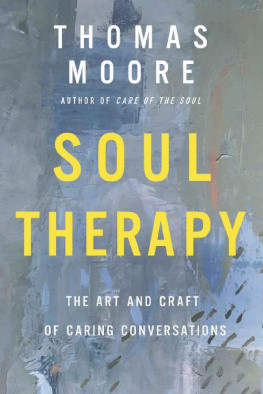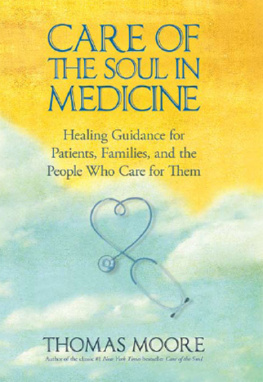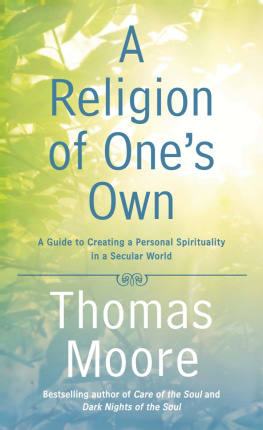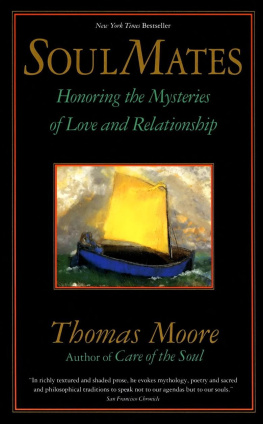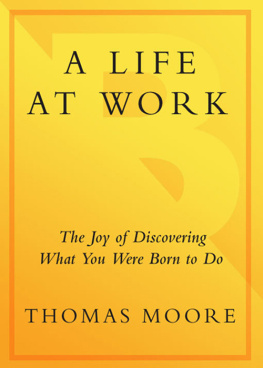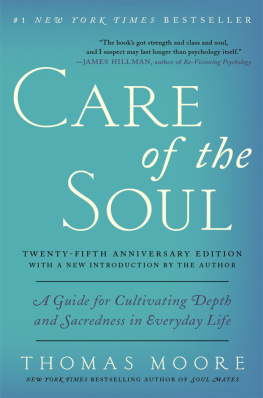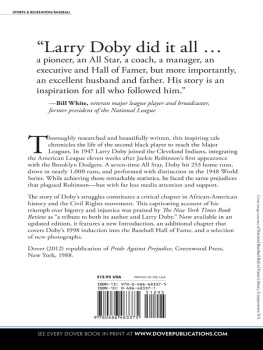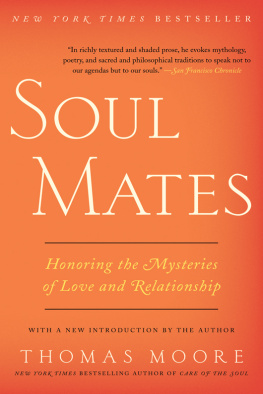Thomas Moore - Soul Therapy
Here you can read online Thomas Moore - Soul Therapy full text of the book (entire story) in english for free. Download pdf and epub, get meaning, cover and reviews about this ebook. year: 2021, publisher: HarperCollins, genre: Religion. Description of the work, (preface) as well as reviews are available. Best literature library LitArk.com created for fans of good reading and offers a wide selection of genres:
Romance novel
Science fiction
Adventure
Detective
Science
History
Home and family
Prose
Art
Politics
Computer
Non-fiction
Religion
Business
Children
Humor
Choose a favorite category and find really read worthwhile books. Enjoy immersion in the world of imagination, feel the emotions of the characters or learn something new for yourself, make an fascinating discovery.
- Book:Soul Therapy
- Author:
- Publisher:HarperCollins
- Genre:
- Year:2021
- Rating:3 / 5
- Favourites:Add to favourites
- Your mark:
- 60
- 1
- 2
- 3
- 4
- 5
Soul Therapy: summary, description and annotation
We offer to read an annotation, description, summary or preface (depends on what the author of the book "Soul Therapy" wrote himself). If you haven't found the necessary information about the book — write in the comments, we will try to find it.
Soul Therapy — read online for free the complete book (whole text) full work
Below is the text of the book, divided by pages. System saving the place of the last page read, allows you to conveniently read the book "Soul Therapy" online for free, without having to search again every time where you left off. Put a bookmark, and you can go to the page where you finished reading at any time.
Font size:
Interval:
Bookmark:
Its a simple fact: life is difficult and imperfect. Everyone has tragedies, losses, anxieties, and relationship issues. And so there are moments in most lives when it would be a great help to have someone to talk to about our troubles. Maybe everyone should be in therapy, at least at certain pressing times in life. Psychotherapy is an excellent profession, but sometimes just talking to a close friend, a spiritual guide, or a family member can help. Therapy in a general sense can go on anywhere and take many different forms.
I have been a psychotherapist for several decades and have had the honor of being intimately involved with people as they struggle with seemingly impossible issues. I have learned that being a therapist is different from doing therapy. Its not just a job or a skill but a way of being in the world. All day long and every day you learn to have a caring attitude, to listen closely, and to see beneath the surface.
It takes good ideas and an open heart to do therapy well. You are the main instrument of the work, and you can never stop learning about how human beings operate and who you are. You become a therapist first through self-discovery and then by learning how human life in general works. I feel that every hour of therapy I do teaches me and leads me further in my training. Its a kind of learning that never ends, because human beings are infinitely complex.
This is a book for both therapists and the ordinary person wanting to offer comfort and an attentive ear to a friend or relative. We are all therapists at times, and it would be helpful for the average person to know how to counsel another person well. For therapists, I hope this book deepens your work.
Therapists and Therapists
Some people are therapists professionally. They have university degrees, licenses, and credentials. They have offices and big chairs and some even the classic couch. They talk the jargon and often appear to have no troubles of their own.
Im teasing a little here, because I love therapists. I think they are lucky to have the best profession there is, helping people deal with crises and conflicts. I have taught them and consider many of them my good friends.
But I also know many therapists. The quotation marks are important, because they take the word out of its literal meaning. Sometimes you get a phone call from a relative asking if you would have a private conversation about something he is struggling with, maybe difficulty in a marriage or a serious illness. Or you may be a manager in a company and an employee is having trouble with her children or drinking too much or needs some vocational guidance. You may be a minister or rabbi and people come to you for counseling even though you have never had formal training. You contact the therapist in you and offer your care and concern.
I define therapy as care of the soul. In this sense therapy happens in all places all the time. And this is real therapycaring, helpful, generous listening and responding. It is not the expert probing of a life for meaningful patterns and influential parental figures, saythats the work of professional therapistsbut it can be effective and critically important nonetheless.
When I teach therapists, I realize that they are people, too. They come to me as a teacher for care of their souls and for deeper and more meaningful ways of doing their work. So I dont see a thick wall between therapist and client. They are both persons trying to make sense of lifes intricacies.
I usually recommend to therapists that they use friendship as the underlying dynamic of their work. I dont mean they should become literal friends with their clients but that the spirit underlying the relationship could be friendship. That means that the lay or amateur therapist is really doing therapy of a sort when they listen closely to their friend in distress. The lay therapist has much to learn from the professional, and the professional can learn from the layperson.
In this book, then, I speak to both the professional and the ordinary person. At times I turn toward one or the other, but overall I think they can learn from each other, from the spirit and manner of both ways of relating. I write directly, for the most part without jargon. But I do think the amateur could benefit from some deeper and more technical explorations of psychological terms like transference and complex. If youre learning how to be a power user with your computer or smartphone, you have to become acquainted with technical concepts. To do good therapy in the lay sense it wouldnt hurt to know some psychology.
The Platonic Therapist
My background for therapy includes Jungian and archetypal psychology, studies in religions and spiritual traditions, the arts, and even practical philosophy. When I teach therapists, I add to their professional training ideas and skills that are spiritual and philosophical. Therapy is not a new concept. Plato, the Greek philosopher who lived in the fourth century BC, wrote about the soul and often used the word therapy, which he defined as daily care and service. The word psychotherapy literally means soul care.
So I suggest letting go of any idea that you have to solve your friends or your clients problems and instead think of therapy as care and service. The caring friend can learn from the professional how to listen, speak, and comport herself. What the therapist learns in her training is relevant to the average person, both for her own life and for helping others. Ordinary people tend to give advice, which is more about them than the person they want to help. They often fail to separate their own lives and values from the person they are talking to. The amateur can also get caught in powerful emotional complexes and end up keeping the friend stuck in the pattern that has caused him trouble. Im not suggesting that you pretend to be a professional therapist but that you dip into your own experience, find some wisdom, and listen closely to what your friend has to say. That is therapy as care of the soul.
For almost twenty years I taught psychiatrists, doctors, social workers, and psychologists who came to the New England Educational Institute on Cape Cod for their required continuing education credits. My purpose was to deepen their perspective through my studies on soul and my background in spirituality. In my youth I was a Catholic monk for twelve years and learned spiritual techniques firsthand and in depth. Then I studied C. G. Jungs works thoroughly and have taught at Jung societies in many places. Later, I will describe my work in the archetypal psychology originated by my friend James Hillman. In those summer sessions I found that professionals generally had a good education and training, but they had little exposure to depth psychology and the worlds spiritual traditions.
My approach to therapy, rooted in a more philosophical and spiritual psychology, is particularly suited both to the professional who wants to go beyond medications and behavior changes as well as to the ordinary person who feels called to help friends and relatives when life gets complicated. Some people know that deep down they have a knack for listening and offering insights to their friends, a calling to an informal but deeply satisfying intimacy with others. The depth of this way of understanding therapy narrows the gap between the professional and the lay soul guide.
In their training, therapists learn that common sense is not always useful in counseling others. Human life is full of paradoxes and contradictions. Trained therapists are usually good at spotting hidden patterns, while nontrained laypeople tend to use simple logic. For example, a local therapist recently appeared on television to help people deal with anxiety. First, she said, you have to acknowledge your fear, and then you can search out some comfort. This is a basic strategy for a therapist, but a nonprofessional therapist might skip the acknowledgment part and just go for the comforting.
Font size:
Interval:
Bookmark:
Similar books «Soul Therapy»
Look at similar books to Soul Therapy. We have selected literature similar in name and meaning in the hope of providing readers with more options to find new, interesting, not yet read works.
Discussion, reviews of the book Soul Therapy and just readers' own opinions. Leave your comments, write what you think about the work, its meaning or the main characters. Specify what exactly you liked and what you didn't like, and why you think so.

